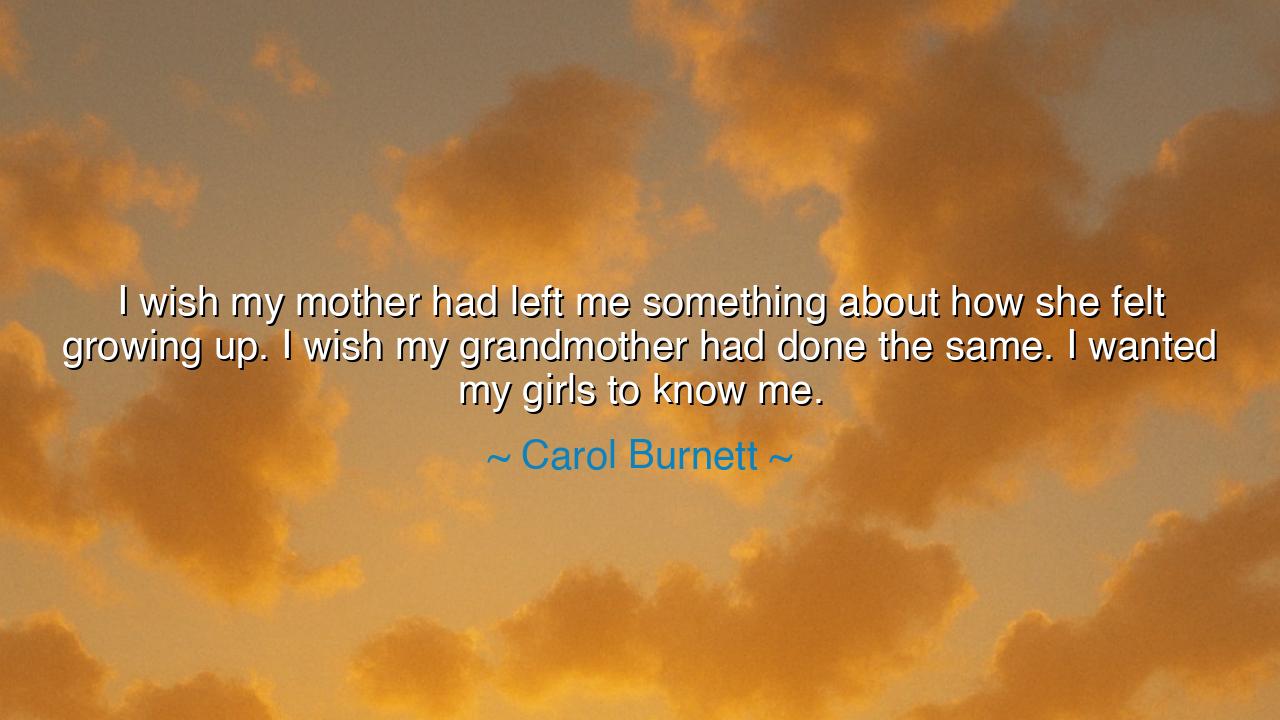
I wish my mother had left me something about how she felt growing
I wish my mother had left me something about how she felt growing up. I wish my grandmother had done the same. I wanted my girls to know me.






In the tender and soul-searching words of Carol Burnett, “I wish my mother had left me something about how she felt growing up. I wish my grandmother had done the same. I wanted my girls to know me.” we hear not only longing, but a timeless lament—an echo from every generation that has ever wondered who they came from, what their mothers dreamed, feared, and felt. It is a yearning older than memory itself: the desire to be known, not merely through deeds or lineage, but through the private truth of the heart. Burnett, a woman of laughter and light, here reveals her deepest vulnerability—the ache of absence not in presence, but in understanding.
The origin of this quote lies in Burnett’s own life, one marked by hardship, resilience, and triumph. Born to parents who struggled with addiction, she was raised primarily by her grandmother in poverty. Yet, through grace and humor, she rose to become one of the most beloved entertainers in history. Behind her wit, however, was a daughter who longed to understand her mother beyond the surface—beyond the laughter, beyond the hardship. Her words came from that quiet ache: the wish that her mother and grandmother had left behind not material things, but the story of their souls. For she knew that to pass on one’s truth is to give one’s descendants the map to understanding themselves.
The ancients held sacred the act of remembrance. In every culture, there were scribes and poets, storytellers and chroniclers whose task was not only to record history, but to preserve emotion—to capture how it felt to be human in a particular time and place. The Egyptians carved their joys and laments into stone; the Greeks passed their passions into epic verse; the Hebrew prophets inscribed their sorrows and triumphs into scripture. They knew that memory, if untold, dies twice—once with the body, and once with silence. Burnett’s words call us back to that ancient understanding: that to be remembered truly, one must speak truthfully.
Consider the story of Anne Frank, the young girl who, amid terror and confinement, wrote her heart into the pages of a diary. She did not write for fame, nor for history, but to make sense of her own becoming—to leave behind a record of her thoughts, her fears, her small joys in a world collapsing around her. Centuries from now, when all monuments have faded, her words will still breathe. Through her, we know not only her own soul but the echo of millions. In her diary, she accomplished what Burnett longed for: she left behind a living mirror of her humanity, an unbroken bridge between generations.
Burnett’s reflection is also a call to courage—for to leave one’s story behind is to face oneself. Many mothers and fathers keep their hearts locked in silence, believing their struggles unworthy of record, or their feelings too heavy to share. Yet the act of writing, of speaking, of leaving one’s truth, is a sacred offering to those who come after. It says: I lived. I felt. I loved and failed and hoped as you do now. When Burnett wished for her mother’s words, she was not asking for perfection—she was asking for connection, for honesty, for the thread that ties mother to child through time.
The lesson in her words is clear: do not let your life pass without leaving your voice. Speak your truth, write your story, share your fears and joys with those who will follow you. For the greatest inheritance is not wealth or property, but understanding. It is the gift of knowing that one’s ancestors were human—complex, flawed, and alive. Your story, no matter how ordinary it may seem, will one day be a lantern for someone else’s darkness.
And so, let this teaching endure: memory is the bridge between generations. When you write your story, you build that bridge; when you remain silent, the river of time swallows what might have guided another. Be as Burnett wished her forebears had been—brave enough to leave behind the truth of your heart. Tell your children who you are, not just what you did. For love deepens when it is known, and life, when shared, becomes eternal.
Thus, through Carol Burnett’s simple, aching words, we are reminded that legacy is not measured in applause or achievement, but in remembrance. The mother who tells her story gives her child the keys to her soul. And the child who listens inherits not just a past, but a living flame—a lineage of truth, carried forward into forever.






AAdministratorAdministrator
Welcome, honored guests. Please leave a comment, we will respond soon